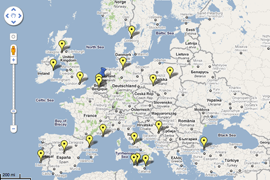Wroclaw has been chosen as European Capital of Culture for 2016 because it is one of the most rapidly developing cultural centers. The project Wroclaw European Capital of Culture 2016 is responsible for balancing the development of culture in the city; they have to engage people in creating a common culture.
However, their work is encountering several difficulties. One of the main problems they are finding is from the people of Wroclaw themselves: people are avoiding any kind of involvement because they had bad experiences in the past. Poland is a country “where people lost trust and their belief that they could have any influence on what is being done at the Political level,” says the chief specialist at the office of Wroclaw European Capital of Culture 2016, Roland Zazycki. “They don’t want to waste their time if they don’t have any influence on what’s going on in the city,” he adds.
This problem is coupled with the fact that we live in a much more individualistic society “where people are taught to care and be responsible only for themselves (and maybe their families),” says Zarzycki. In their partnership, they aim to encourage and revive “the social dimension of culture, the people’s creative power and enthusiasm.”
Other problems they are also finding are that they can see a lot of tensions between the interests of the economic growth of the city and its cultural growth. As says Zarzycki “To certain extent simple personal clashes cause some difficulties. The cooperation between different sectors, institutions and departments is some somehow affected by particular animosities.” The co-author of the Wroclaw’s bid for the title of European Capital of Culture talks also about the low interest of central government deboted to the project, and also the ECoC is receiving little promotion in the national media.
To combat this, Zarzycki argues that they “need wider social activity; we need people to become artists, to bring culture into their lifes, but in an active and creative way. We need lots of investments in the infrastructure that will create a space for the people, for free, unrestricted expression of their feelings and needs. And we need people, organizations and institution that will convince the others that is worth trying. What we basically do not need are spectacles. We need instead a genuine culture that will help to solve difficult social problems”.
The organization ECoC also tries to solve other social problems, focusing on the ideas of migrations, social and financial exclusions, social communication, commodification, Metamorphoses of cultures, and public inter-passivity agoraphobia.
In a practical level, said Zarzycki, “We focus on events, and events on which are especially addressed to a broad audience including active young people and foreigners. That work cultural events can count on continuation. Hopefully there are also more and more small events and Initiatives implemented on the grass-root level. ”
According to Zarzycki, their activities are developing “at this moment with some successes. Social participation is the most important cultural task/goal and it’s nothing strange in the fact that still there is a long way in front of us”.
Besides this, the institution ECoC is organizing events to try to encourage people to visit museums. One of the events that have created is accentuated by Zarzycki “We organized an action that took place on the Grandma and Grandpa and it brought lots and lots of children accompanied by their grandparents to the museums not only in Wrocław but in whole region (including German city Görlitz and Czech city Hradec Králové). Many cultural institutions participated in the project and they noted a significant increase in the number of visitors (in some cases even more than ten times than the usual number). One can say: it worked”.
